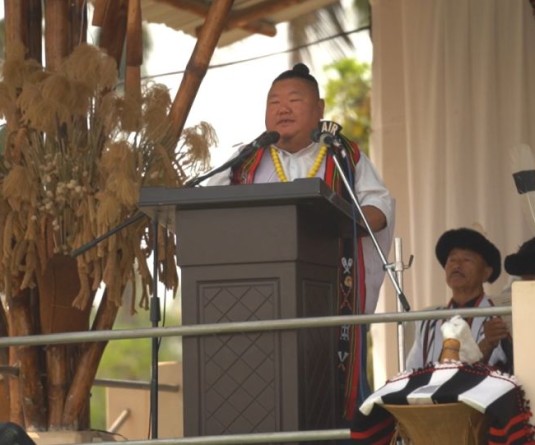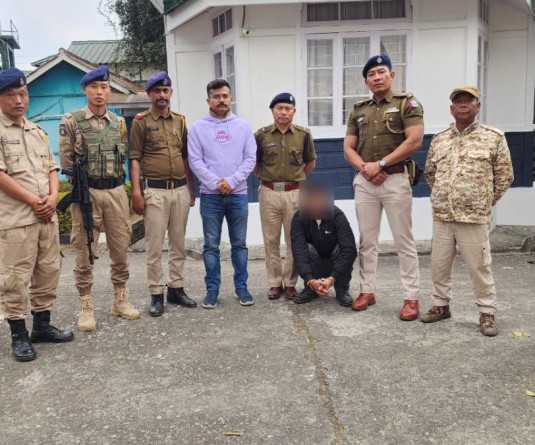
(From Left) President of JN Aeir Society and also the acting principal of the college, I. Limatemjen; Commissioner & Secretary FP Solo; joint director, department of horticulture Dr. Benjong Aier; and a former minister in the Nagaland government Chubatemjen, who once studied as a student under JN Aeir. (Morung Photo)
DIMAPUR, MAY 28 (MExN): The number of educational institutions in Nagaland offering higher education rose to 54 on Saturday, May 28 with the launch of JN Aeir College in Dimapur. The college was so named in honour of a pioneer educationist among the Aos, particularly to the villages coming under Japukong range of Mokokchung district – nonagenarian JN Aeir.
The realization of the college was the pet project of JN Aeir Society, whose dream was to enshrine the contribution of the educationist in the concrete form of a sit of learning, under the due recognition of Nagaland University.
Commissioner & Secretary FP Solo formally declared the commencement of the college at an inaugural programme held at the college campus at 4th Mile, Dimapur. “I visualize a great potential for the college in the future”, said Solo in his address while adding: “I hope it realizes its goal.” Emphasizing on the immense contribution of private run colleges, Solo said the number of recognized colleges in the state at present stands at 53. Out of this 39 are private run institutions catering to 2/3 rd of students pursuing a college education within the state. However, he expressed concern at the current Gross Enrollment Rate (GER) of students pursuing higher education in the state. It stands at a dismal 9.47 percent against the national average of 12.7 percent. Further out of the 53 colleges, only 19 have fulfilled the minimum UGC requirements that make them eligible for university grants. On this, Solo pointed out the urgent need to render higher education more accessible in the state. Reiterating the government’s commitment to reverse the poor ratio, he added the government has taken over atleast one college in every district of the state.
Citing the case of Mon district, Solo said that this year more than a thousand passed the HSLC examinations this year. However, the shortage of higher secondary schools in the district has stretched the capacity of the only government run Wankhao College. Thus, the government was compelled and had initiated the expansion of classrooms.
Quality, he asserted is the most important aspect of education. Hence, he urged on the requirement of qualified and dedicated teachers. “We want them (students) to become assets rather than become liabilities.” Afterall, the reputation of a college will ultimately depend on the performance of the students. The college is only beginning and its reputation as quality centred institution will depend on its pupils, he said.
The realization of the college was the pet project of JN Aeir Society, whose dream was to enshrine the contribution of the educationist in the concrete form of a sit of learning, under the due recognition of Nagaland University.
Commissioner & Secretary FP Solo formally declared the commencement of the college at an inaugural programme held at the college campus at 4th Mile, Dimapur. “I visualize a great potential for the college in the future”, said Solo in his address while adding: “I hope it realizes its goal.” Emphasizing on the immense contribution of private run colleges, Solo said the number of recognized colleges in the state at present stands at 53. Out of this 39 are private run institutions catering to 2/3 rd of students pursuing a college education within the state. However, he expressed concern at the current Gross Enrollment Rate (GER) of students pursuing higher education in the state. It stands at a dismal 9.47 percent against the national average of 12.7 percent. Further out of the 53 colleges, only 19 have fulfilled the minimum UGC requirements that make them eligible for university grants. On this, Solo pointed out the urgent need to render higher education more accessible in the state. Reiterating the government’s commitment to reverse the poor ratio, he added the government has taken over atleast one college in every district of the state.
Citing the case of Mon district, Solo said that this year more than a thousand passed the HSLC examinations this year. However, the shortage of higher secondary schools in the district has stretched the capacity of the only government run Wankhao College. Thus, the government was compelled and had initiated the expansion of classrooms.
Quality, he asserted is the most important aspect of education. Hence, he urged on the requirement of qualified and dedicated teachers. “We want them (students) to become assets rather than become liabilities.” Afterall, the reputation of a college will ultimately depend on the performance of the students. The college is only beginning and its reputation as quality centred institution will depend on its pupils, he said.
JN Aeir (born 1918) – A brief profile
Aeir after passing Intermediate Arts in 1944 set up Alongtaki Middle English School in 1945, where he also served as the headmaster. He then went on to pursue BA Honours in Education from Cotton College, Guwahati, passing out in 1949. From 1958-63, he also served as the headmaster of Clark Memorial School at Impur. IN 1963, he took the initiative of establishing a Middle School at Yajang (his ancestral village) where he served at the headmaster. He also had a brief stint as an inspector of schools in 1972. He was also responsible for starting Yajang Students Union, the first students’ body in Japukong range in 1937. Throughout his career he served the society in various capacities.






